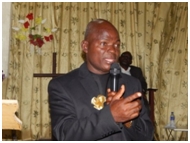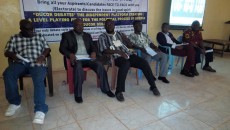UNIFICATION CITY, Margibi – The Acting Mayor of Unification City, Emanuel Fatumay, has announced plans to begin the collection of municipal taxes on business within the city.
Fatumay said the tax is intended to develop the city and increase essential social services. He said the Unification City Corporation currently does not collect any tax except for garbage disposals. He said the UCC had charged every family head LR$20 weekly to dispose of waste within the city.
“This amount is [meant to be] a trial for further taxes,†he said.
Fatumay told The Bush Chicken that the garbage collection that began less than a year ago is now bringing some improvements in the sanitation of the city.
“Unlike in the past, garbage is no longer piled in the communities for long periods because it is collected on time,†he said.

The Acting Mayor of Unification City, Emmanuel Fayiah Fatumay, Photo credit: Gbatemah Senah
Fatumay said the City Council, in line with the central government, was looking for ways to develop and improve services within the city. The council, which is comprised of local leaders, is currently considering providing water to residents.
“Other taxes would be introduced as the need for particular developments and services for the city, and its residents are seen,†Fatumay said.
According to him, the municipal taxes is a new idea for most residents in the city. “We are slow in enforcing all the necessary city regulations because the residents [have been] slow in adjusting to them,†he told The Bush Chicken.
Some residents have welcomed the city’s introduction of the taxes. They, however, want to make sure the taxes are being used to improve services.
James Holder, a resident and property owner, wants the city to go beyond garbage collection and work to develop the city. He told The Bush Chicken that garbage collection is good, but it is also important that the city corporation provides other services like better security, water, and road maintenance.
Daniel Johnson, a businessman, told The Bush Chicken that he would like to see city authorities introduce low-cost electricity. He said electricity and water are important to businesses and residents.
Unification City, which has a population of over 36,000 residents, currently hosts the district’s office, a police depot, magisterial court, over eight high schools, two fueling stations, one market building, a soccer pitch and a cinema.
It also has two mosques, more than twelve churches, over six entertainment centers and night clubs, one mortuary, two clinics, several drug stores, several video clubs, one central street and four auxiliary roads.
Despite all these businesses, the city lacks a convenient public latrine system, pipe-borne water, and electricity.
Unification City, situated near the Roberts International Airport, was created by an act of the national legislature in 2003, creating the Mboo Statutory District. The act appointed Unification City, formerly Unification Town, as the administrative headquarters of the statutory district.
Ten years following the creation of the district, its first leadership appointment was made in 2013 by President Ellen Johnson Sirleaf. Those appointed were Henric Marcus Speare, Superintendent, and Francis Okai, Commissioner of Farmington District. They were confirmed one year later by the Liberian Senate. Currently, there has been no direct budget allotment for the district.
Speare complained that he had operated the district’s office from his personal income and handouts from friends and other officials of the county. Authorities of Margibi and Ministry of Internal Affairs say they are making efforts to have the statutory district benefit from direct government funding.
Fatumay is the Acting Mayor of Unification City. He has since been recommended to the President for the nomination by the district’s authorities. He served as Commissioner of Charlesville Township prior to the existence of Mboo district.
Article 54 of the Liberian Constitution gives the president the power to appoint mayors of cities, with the consent of the Senate. Delegates at the National Constitution Review Conference, held in Gbarnga in April, voted to change this provision. If the change is made, mayor of cities will be elected by the citizens rather than being appointed by the president.
Many citizens feel the appointment of city mayors directly reflects the president’s will and pleasure in the governance of the cities and not the people’s.
Mohammed Kamara, a businessman in Unification City, said the city mayor will be more accountable to residents of the city if they elect him or her. He believes the effect will be more development in the city.
Jenneh Kpoto, a businesswoman, also told The Bush Chicken that the slow developments in the towns are due to a lack of passion and sincerity in leadership. She said that most city officials are not true servants.
“As for me, I want us to elect our own mayors because we need people that will have our mandate,†she said.
Featured image courtesy of Gbatemah Senah



